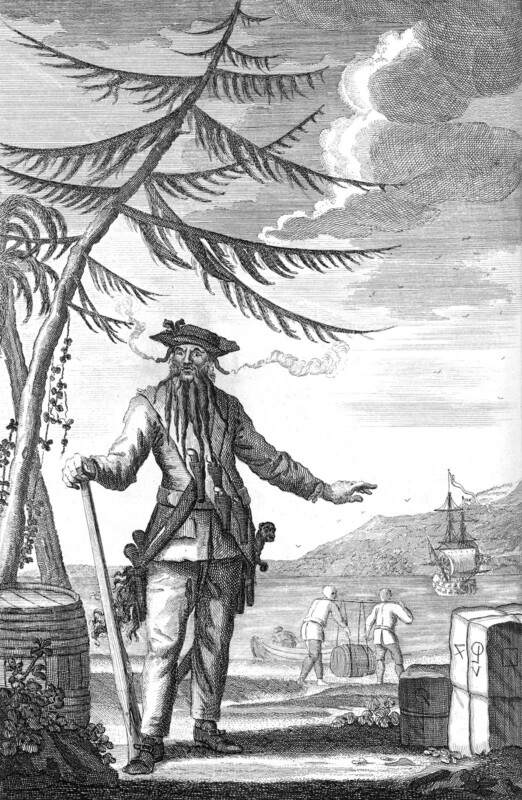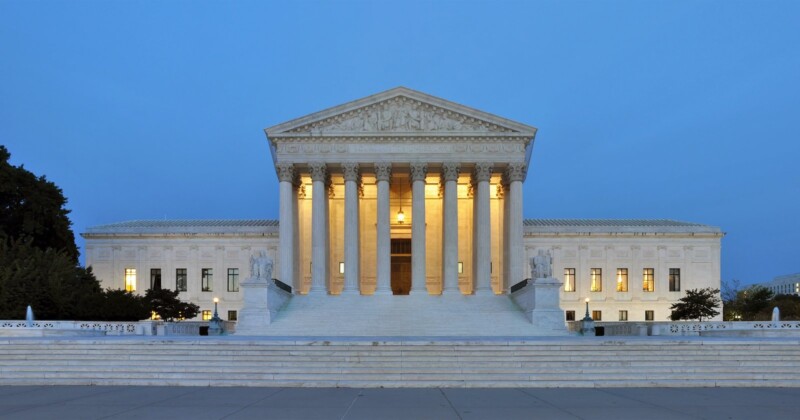US States Can Still Steal Your Photos, Despite Repeal of ‘Blackbeard’s Law’
![]()
Although overshadowed by more recent, highly publicized court cases, the U.S. Supreme Court made a significant, controversial ruling that upheld North Carolina’s “Blackbeard’s Law” in March 2020, a decision that protected states from being sued for copyright infringement. As CityView reports, the divisive law has now been repealed by the North Carolina state government.
The History of Blackbeard’s Law
The newest development comes a decade after North Carolina’s Department of Natural and Cultural Resources violated copyrights owned by underwater photographer Rick Allen. The department took footage owned by Allen and his company, Nautilus Productions, and used it without permission, licensing, or making any payment to Allen.
The footage in question shows the shipwreck of Queen Anne’s Revenge. The ship was commanded by one of the most infamous pirates of all time, Edward Teach, better known as Blackbeard.
Blackbeard was born around 1680 in England. While little is known of his early years, he ultimately settled into a relatively short but influential life of piracy throughout the Atlantic, including along the eastern coast of England’s American colonies.

At the height of his power in 1718, after having received a royal pardon, Blackbeard blockaded the vital port of Charles Town in what is now South Carolina. This decision, among others, precipitated a series of conflicts in the Carolinas.
On November 22, 1718, Blackbeard and some of his crew were killed by a small platoon led by Lieutenant Robert Maynard of the British Royal Navy. Maynard, who was assigned the task of killing the troublesome Blackbeard, lured Teach into attacking Maynard’s ship, the HMS Pearl. In the bloody, violent conflict that killed Blackbeard, Queen Anne’s Revenge ran aground near the area now known as Beaufort Inlet, North Carolina.

Remains of the vessel were discovered by a private research firm, Intersal Inc., on November 21, 1996, almost exactly 278 years to the day after Blackbeard was slain. The shipwreck is about a mile offshore and at a depth of nearly 30 feet. The wreck was added to the U.S. National Register of Historic Places.
“The state of North Carolina is working to protect the site and will do everything we can to that end. We look forward to the day when all North Carolinians can see these exciting artifacts for themselves,” the then-governor of North Carolina, James B. Hunt, said in 1997, inadvertently casting significant foreshadowing.
Ownership and Legal Controversies
As with many shipwrecks, there were valuable artifacts and even precious metals at the site of the Queen Anne’s Revenge. Intersal, the North Carolina Department of Natural and Cultural Resources (NCDNCR), and the Maritime Research Institute (MRI) entered a memorandum of agreement in 1998. Intersal gave up entitlements for coins and precious metals to ensure that artifacts would stay in a single collection. NCDNCR could determine how the artifacts were handled and distributed. MRI had touring rights alongside the NCDNCR.
Rick Allen and Nautilus Productions entered the legal scene in 2013 when Allen signed an agreement with NCDNCR and Intersal for commercial, replica, and promotional opportunities for the shipwreck. The State of North Carolina owns the wreck since it is within state waters, which go three miles offshore. Nautilus Productions had been documenting the recovery of the shipwreck since 1998.
At this point, the legal waters began to get murky. In 2015, archaeological recovery was paused because of lawsuits filed by Intersal against the State of North Carolina, the NCDNCR, and the nonprofit organization Friends of the Queen Anne’s Revenge for alleged contract violations. In 2019, the North Carolina Supreme Court sided with Intersal, which sent the case to a different court. In 2013, a judge issued a ruling in favor of Intersal. The case will be tried by a jury in 2024.
Meanwhile, in 2013 and 2015, North Carolina’s state government used videos of the shipwreck captured by Allen and Nautilus Productions without permission on a state website. This led to Nautilus Productions filing a lawsuit in federal court over copyright violations.
However, before uploading Allen’s videos, the North Carolina Legislate had written and passed “Blackbeard’s Law,” N.C General Statute §121-25(b). Blackbeard’s Law states:
“All photographs, video recordings, or other documentary materials of a derelict vessel or shipwreck or its contents, relics, artifacts, or historic materials in the custody of any agency of North Carolina government or its subdivisions shall be a public record pursuant to Chapter 132 of the General Statutes.”
In other words, the state of North Carolina said that all photographs, videos, and any other documentary materials of shipwrecks or their contents belong to the state and are part of the public record, which means that the government did not need to license Allen’s media, or pay him to use the content.
U.S. Supreme Court Enters the Scene in 2019
Nautilus Productions’ lawsuit ultimately ended up in the U.S. Supreme Court. The court heard oral arguments in Allen v. Cooper on November 5, 2019.
On March 23, 2020, the Supreme Court sided with North Carolina and in the process, dismantled the Copyright Remedy Clarification Act that Congress passed in 1989 in an attempt to curtail states from infringing upon copyrights.

On August 18, 2021, in response to a motion for reconsideration filed by Nautilus Productions, U.S. District Judge Terrence Boyle sided with Nautilus Productions. The state of North Carolina quickly filed a countersuit to the United States Court of Appeals for the Fourth Circuit. The court denied the state’s motion on October 14, 2022.
Nautilus followed up with an amended complaint that cited violations of the Fifth and 14th Amendment14th Amendment constitutional protections on February 8, 2023. Nautilus also alleged that Blackbeard’s Law is a Bill of Attainder.
The Latest Development: Blackbeard’s Law is Repealed
Following the lengthy legal battle and numerous appeals, North Carolina Governor Roy Cooper signed a bill repealing Blackbeard’s Law on June 30, 2023.
“Finally, on June 30, 2023, North Carolina Gov. Roy Cooper signed a bill repealing Blackbeard’s Law. The repeal came after eight years of litigation and is apparently triggered by the State’s realization that it had no legitimate defense to at least one of the federal court claims: that Blackbeard’s Law was a constitutionally prohibited ‘Bill of Attainder’ — a bill that targets and harms an individual, without any due process at all. Since various State legislators had admitted to the motivation, it would have been hard to show otherwise,” writes Nautilus Productions.
Before appearing on Cooper’s desk for his signature, the state legislature unanimously approved the repeal of Blackbeard’s Law.
While the decision is a victory of sorts for Allen, Nautilus Productions, and all copyright holders, Allen is not done yet.
“This isn’t the end of the road, by a long shot, but it’s a good start. The repeal of the law does nothing to negate the past and ongoing copyright violations, damages for those violations, or the eight years in which the state and its affiliates hid behind Blackbeard’s Law to justify their scandalous behavior,” Allen explains.
He points out that even though Blackbeard’s Law has been repealed, that does not affect the protections the Supreme Court granted states from being sued for copyright violations.
What This Means for Photographers and Videographers
North Carolina still says it has the right to violate the copyright holdings of individuals. Or, put another way, the state says that in instances where the state wants to use something, there is no copyright to violate.
“The Copyright Clause and the Fifth and 14th Amendments to the Constitution are meant to protect citizens from unjust and illegal takings of their property without due process or compensation. This lawsuit will benefit all creators, who drive the American economy, and help protect them from intellectual property theft by states. Nowhere in the federal copyright statutes are states exempted from copyright law or immune from lawsuits — yet North Carolina argues just that,” says Allen.
It is important to note that while the U.S. Supreme Court voted unanimously in 2020, it was not necessarily because all the justices thought states should be protected from copyright claims, but rather that they did not believe in Allen’s case to the extent required to overturn precedent established by a lower court.
However, former Associate Justice Stephen Breyer, who retired in 2022, wrote, “One might think that Walt Disney Pictures could sue a state (or anyone else) for hosting an unlicensed screening of the studio’s blockbuster film, Pirates of the Caribbean (or any of its many sequels.) Yet the court holds otherwise.”
Breyer had long disagreed with settled laws that prevented individuals from suing state governments.
“Breyer had a little fun at Kagan’s expense, declaring that in his view, under the Constitution Congress may, as it did in this case, require states that ‘have pirated intellectual property…to pay for what they have plundered,'” writes NPR.
While the problematic Blackbeard’s Law is now gone, that does not mean that creators now have much more protection against states using their content than before. The repeal is a victory in a sense, albeit a very limited one.
States still have “sovereign immunity.” Long after the days when Blackbeard terrorized the Carolinas, piracy lives on.
Image credits: Header photo licensed via Depositphotos.